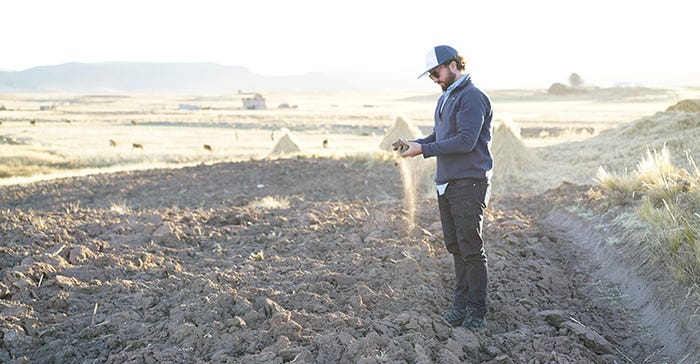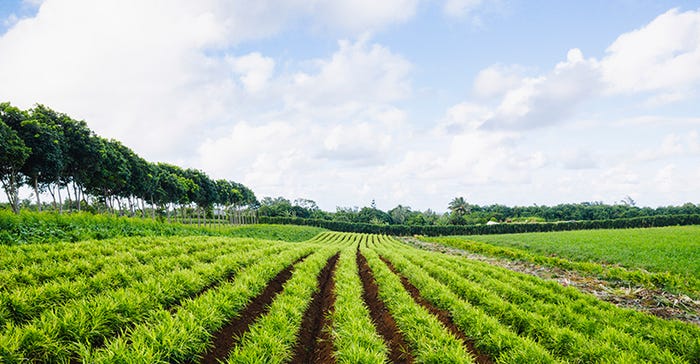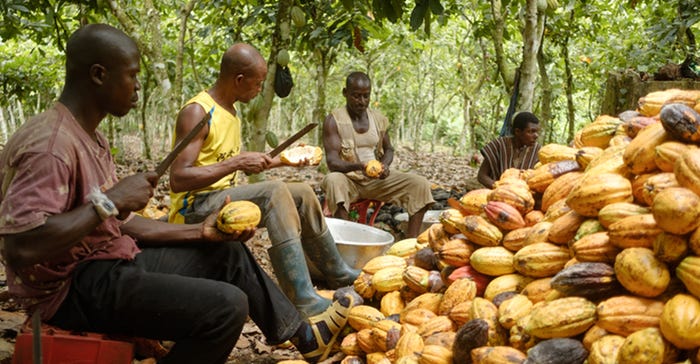15 brands on a mission to improve soil health15 brands on a mission to improve soil health
Regenerative agriculture is just one method these brands employ to restore soil's good health and help mitigate climate change through carbon sequestration.
September 5, 2022

Healthy topsoil—rich in nutrients, organic matter and microbial diversity—is pivotal for the health of people and planet. It is essential for drawing down carbon, filtering toxins, regulating water and sustaining life for millions of plants, animals, bacteria and other organisms.
Sadly, thanks to conventional farming practices and countless other human-driven environmental abuses, topsoil is vanishing 10 times faster than it’s being replenished. The United Nations Food and Agriculture Organization warns than in less than 60 years, Earth’s supply of this invaluable resource will be gone. Given that a whopping 95% of the global food supply is currently grown in topsoil, this is a looming crisis of epic proportions.
Now ready for some good news? Awareness of this massive problem has increased significantly, as have efforts to combat it. We see shining examples of this right here in the natural products industry, with several innovative, values-driven food, dietary supplement and personal care brands holding soil health as a key tenet.
To these companies, this isn’t just a trendy talking point or slick marketing strategy—it’s a do-or-die mission. Whether by funding soil health research, building out organic supply chains or working toward the lodestar Regenerative Organic certification, these brands are taking tangible measures to regenerate the world’s soil.

Food, snacks and ingredients
Quinn
Best known for its delicious Non-GMO Project Verified snacks and farm-to-bag sourcing transparency, Quinn is committed to furthering regenerative agriculture and soil research. Since 2010, the company has sourced organic popcorn from regenerative organic pioneer Dave Vetter of Grain Place Foods, who uses an extensive nine-year crop rotation and other practices to build healthy soil. And for sorghum for its pretzels, Quinn partners with Nebraska regenerative farmer Steve Tucker, who uses no tillage, mixes diverse cover crops and incorporates livestock to feed soil microbes and boost soil health.
Stonyfield
For nearly four decades, organic dairy pioneer Stonyfield has championed soil management practices that capture carbon, nurture below-ground biodiversity and ensure the healthiest food for both people and planet. The Certified B Corporation is committed to having a carbon-positive dairy supply chain by 2030, which involves helping the organic dairy farms in its network measure their climate impact and increase soil carbon sequestration.
Stonyfield is also helping fund, build and trial OpenTEAM, a collaborative community and digital platform that gives farmers easy access to validated regenerative tools and practices. Additionally, the company’s StonyFIELDs program helps communities convert parks and athletic fields to organic, aiming to reduce kids’ exposure to toxic chemicals and turn these green expanses into climate change solutions.
Navitas Organics
Plant-based superfoods company Navitas Organics, another Certified B Corp, has been rooted in organic agriculture since its inception nearly 18 years ago.
“Organic farming and its practices can create resilient soil that increases biodiversity and water retention, prevents erosion and runoff, and creates nutrient-dense food,” says Max Darcey, director of sustainability and quality at Navitas. “That is why we have always sourced from growers that are organic certified and who ensure their diverse farming practices are growing food in a way that follows and supports nature.”
SIMPLi
Co-founded in 2020, SIMPLi sources single-origin ingredients directly from farming communities worldwide, working with them to grow environmentally beneficial crops using regenerative practices. The Regenerative Organic Certified and Fair for Life Certified company focuses on vital cover crops such as quinoa and lupini beans, a rotational crop of quinoa that absorbs atmospheric nitrogen into the soil through its roots. In 2021, SIMPLi launched portfolio of unique Regenerative Organic Certified quinoa products.
Figure Ate Foods
Figure Ate Foods was launched to support White Buffalo Land Trust, a nonprofit dedicated to regenerative agriculture, with 100% of the proceeds benefiting soil health, water cycle health and increased biodiversity.
“Each of our products begins by identifying an ecological need that can be addressed through regenerative agriculture and finishes as a nutrient-dense, delicious food that restores our bodies, communities and ecosystem,” says Kyle Sullivan, marketing director at White Buffalo Land Trust.
This year, Figure Ate launched the first regeneratively sourced and Certified Humane beef biltong sourced from White Oak Pastures, a Land to Market-verified, carbon-negative ranch guided by Ecological Outcome Verification.
White Leaf Provisions
Not finding any high-quality, non-GMO baby or toddler foods that showcased regenerative agriculture, the husband-wife co-founders of White Leaf Provisions created their own. Using Demeter biodynamic certification as their North Star, they traveled the globe to find farmer partners who could produce ingredients at scale.
Now, with their baby food purees and applesauce SKUs—and soon-to-launch oats and muesli—they are on a mission to make regeneratively farmed foods widely accessible while also regenerating soil. White Leaf Provisions, which itself is certified by Demeter USA, also partners with sustainable-food database HowGood and nonprofit Kiss The Ground and its Regenerate America campaign for healthy soil.
General Mills
Along with its corporatewide commitment to advance regenerative agriculture on 1 million farmland acres by 2030, food giant General Mills owns several brands with distinct soil health initiatives:
EPIC Provisions, maker of animal-based protein snacks, partners with domestic grass-fed suppliers to implement regenerative agriculture and holistic livestock management. One of Epic’s top beef suppliers has achieved Ecological Outcome Verification for its documented advancements in soil health, biodiversity and ecosystem function.
Building upon its longtime commitment to organic, Annie’s helps supplier farms covert to regenerative practices and measure outcomes such as soil structure, nutrient availability, microbial diversity and carbon stocks.
Clean-label snack brand LÄRABAR funds regenerative almond research to help make almond farming more sustainable.
Cascadian Farm Organic has long sourced certified-organic fruits, veggies and grains for its cereals, granolas and bars. Through its Cascading Change initiative, the brand is partnering with The Nature Conservancy to protect wildlife habitats, regenerate groundwater and implement more sustainable farming practices in California’s Central Valley.

Supplements
MegaFood
Whole-food supplement brand MegaFood believes strongly in regenerative agriculture’s ability to address the soil crisis, reverse climate change and increase nutrient density in food. The Certified B Corp uses its Healthy Farm Standard scorecard to find regenerative farming partners that align with its key values of building the soil, conserving resources and supporting thriving livelihoods. MegaFood also supports farmers in these efforts through on-farm investments and consulting. Additionally, the company is conducting a five-year study with Kauai Organic Farms to measure the positive nutritional impact of regenerative practices.
True Grace Health
Founded by industry veterans and early champions of regenerative agriculture, new entrant True Grace sources every ingredient for its nutrient-dense supplements and packaging with an eye toward human and environmental health. The company is partnering with Rodale Institute on the Vegetable Systems Trial, the first side-by-side study of organic versus conventional farming’s impact on nutrient density in crops and carbon sequestration in the soil. True Grace also provides funding to Rodale Institute’s organic consulting service, which helps farmers transition to regenerative organic systems.
Ancient Nutrition
Ancient Nutrition’s R.A.N.C.H Project embodies the supplement brand’s commitment to regenerative agriculture, nutrition and climate health. Already carbon neutral, the company aims to become carbon negative by June 2024, in part by planting 1 million perennials on its certified-organic, regenerative farmland to sequester carbon and yield superfoods to use in its products.

Personal care products
Dr. Bronner’s
A longtime leader in regenerative, organic and fair trade sourcing, Dr. Bronner’s co-founded the Regenerative Organic Certified standard and is transitioning much of its supply chain to this benchmark. In 2020, the brand debuted its first ROC products, Whole and White Kernel Virgin Coconut Oils. Last year Dr. Bronner’s launched a chocolate line to support farmers practicing soil-regenerating dynamic agroforestry (DAF) and has now partnered with Ecosia to finance the expansion of DAF in Ghana.
Thrive Natural Care
Innovative personal care brand Thrive Natural Care built its entire business model around regenerative ag. Knowing that wild plants are potent and resilient, the company mimics the region’s natural conditions on its regenerative farm in Costa Rica to grow skin-supporting native plants juanilama and fierrillo. A wide diversity of flora and fauna make the farm’s soil is rich in microorganisms while the entire endeavor enhances the livelihood of farmers.
About the Author
You May Also Like



